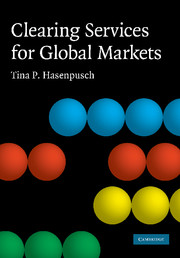 Clearing Services for Global Markets
Clearing Services for Global Markets Book contents
- Frontmatter
- Contents
- List of figures
- List of abbreviations
- Acknowledgements
- Foreword
- 1 Introduction
- 2 Setting the stage – definitions and industry setting
- 3 Defining the core issues – efficiency and network strategies
- 4 Collecting empirical insights – introduction to the empirical study
- 5 Analysing costs of derivatives clearing – transaction cost studies
- 6 Exploring theoretical basics – scale effects in clearing
- 7 What theory reveals – framework for efficiency analysis of network strategies
- 8 Checking theory against reality – case studies of network strategies
- 9 Quantifying the efficiency impact – European network strategies
- 10 Introducing the future network economy – development of the clearing industry
- 11 Summary, discussion and recommendations for future research
- Appendices
- Bibliography
- Index
- Frontmatter
- Contents
- List of figures
- List of abbreviations
- Acknowledgements
- Foreword
- 1 Introduction
- 2 Setting the stage – definitions and industry setting
- 3 Defining the core issues – efficiency and network strategies
- 4 Collecting empirical insights – introduction to the empirical study
- 5 Analysing costs of derivatives clearing – transaction cost studies
- 6 Exploring theoretical basics – scale effects in clearing
- 7 What theory reveals – framework for efficiency analysis of network strategies
- 8 Checking theory against reality – case studies of network strategies
- 9 Quantifying the efficiency impact – European network strategies
- 10 Introducing the future network economy – development of the clearing industry
- 11 Summary, discussion and recommendations for future research
- Appendices
- Bibliography
- Index
Summary
Very definitely there is a whole host of topics related to clearing. I believe that clearing is a topic that has always been regarded as sort of an operational thing. The exchanges' matching engines have had the glamour. But I think in the long run the value added of clearing exceed the value-added of matching!
Clearing is often regarded as less glamorous than the creative and headline-grabbing business of trading, but it constitutes the core of modern financial market infrastructure. Clearing services not only benefit individual market participants, but markets as a whole by increasing their efficiency. Actually: ‘this dimension of financial markets is fundamental for the proper functioning of the whole. It is, in fact, the very essence of the markets, because it constitutes the basic process of exchange between buyers and sellers.’
When buyers and sellers execute a trade, they enter into a specific legal obligation, i.e. to buy or sell securities or, in the case of derivatives, another underlying. The life cycle of a trade consists of trading, clearing and settlement. Clearing and settlement are commonly referred to as post-trade services. Commonly mentioned in the same breath, the two terms are often confused or thought to be synonymous. Whilst settlement refers to the fulfilment of the legal obligation, clearing is the process that occurs in between execution and settlement, i.e. during the respective time lag. In the context of trading securities, this time lag is usually minimal, but it can be substantial in derivatives trading.
- Type
- Chapter
- Information
- Clearing Services for Global MarketsA Framework for the Future Development of the Clearing Industry, pp. 1 - 15Publisher: Cambridge University PressPrint publication year: 2009


